I’ve lived in the States for 30 years but have never been to Montana. I finally went last week for the very first time to see Glacier National Park. Many have told me this is their favorite national park in the States. While I didn’t get to explore the entire park, there are four hikes that caught my fancy. Here is my guide to hiking in Glacier National Park.
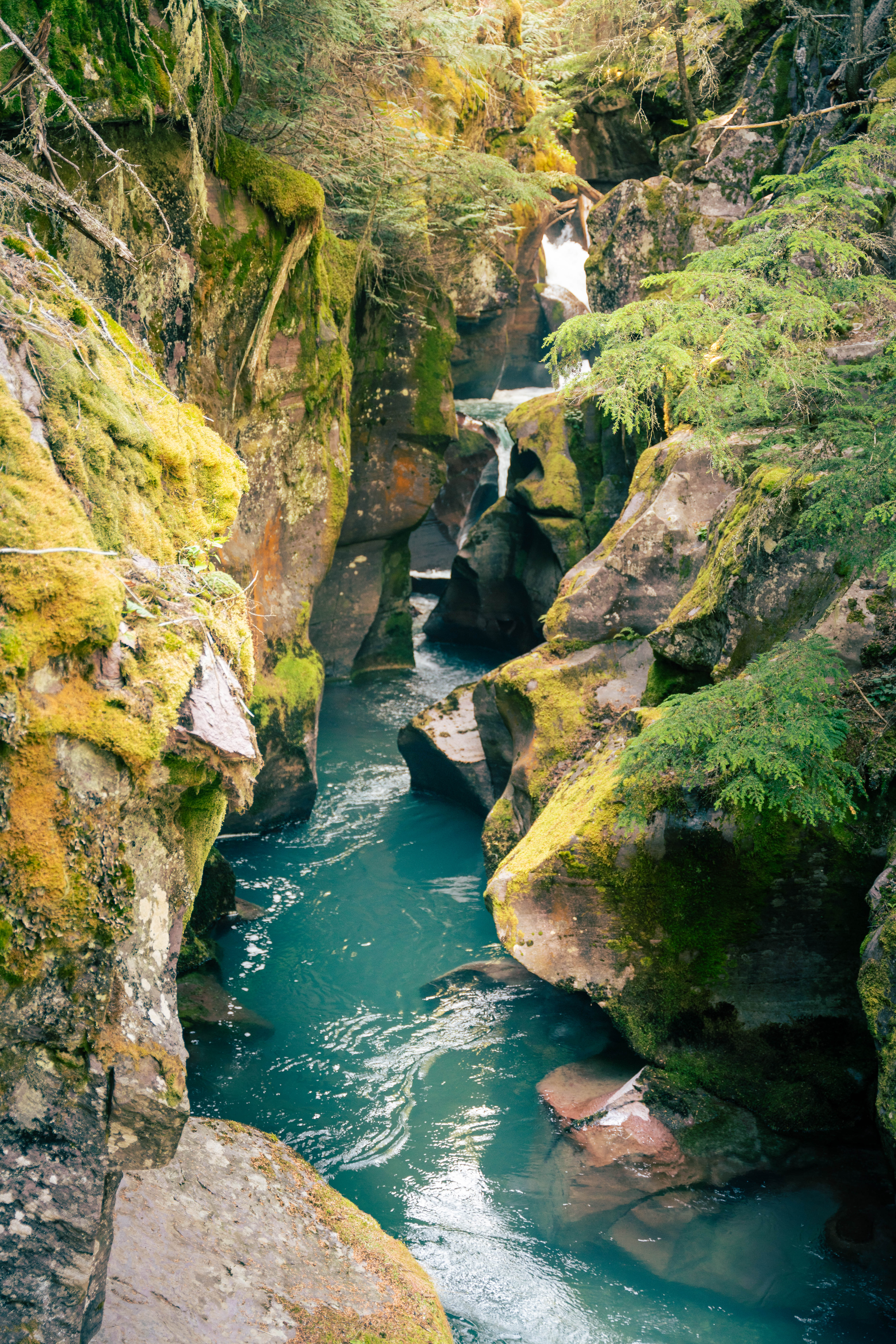
Quick Facts about Glacier National Park
Glacier National Park was established as a park in 1910, and has 762 lakes. Lake McDonald is the largest lake and is a must visit. There are 26 glaciers in Glacier National Park, and unfortunately all are sinking in size. There are 8 Class A campgrounds. with 943 sites and 5 Class B campgrounds with 61 sites. There are also 65 backcountry campgrounds with 208 sites. There are 158 hiking trails and hiking in Glacier National Park is definitely a hiker’s paradise! Tip: Glacier National Park is currently instituting ticketed entry for the Going-to-the-Sun Road corridor from May 28 to September 6, 2021.
When to Visit Glacier National Park
Summer
When to visit Glacier National Park depends on what you want to do! Late June through Mid-September is one of the best times to visit this park if you want to experience Going to the Sun Road, raft and fish the rivers, hike the trails, visit the backcountry Chalets, and explore several areas of the park, on both sides of the Continental Divide.
Spring
If you’re into biking on the Going to the Sun Road before it opens to vehicle traffic, then May through mid-June is the best time to visit Glacier National Park! The Sun Road typically opens mid-to-late-June (although this depends on the snow levels so check nps.gov). There’s a fairly short window to ride a bike all the way from West Glacier to Logan Pass, and that is typically in mid-June. However, lower sections of the road become rideable in early May. Because of water levels from the melting snow, rafting during this season is also thrilling for those who like big water. However, hiking in Glacier National Park during this time may not be possible (on some trails).
Fall
September through mid-October is a great time for fall and solitude lovers. The west side trees begin changing color in mid-September. The east side trees usually wait until early October to go golden. Larch, or tamarack, put on an incredible show beginning in mid-October. By mid-late September, all lodging within park boundaries, and most services, are closed for the coming winter. Solitude reigns. For visitors who love uncrowded, lower elevation rivers and hiking trails, fall is the best time to go hiking in Glacier National Park.
Winter
You may not be able to go hiking in Glacier National Park in winter but if you love skiing and snowshoeing, then think about exploring the Going to the Sun and Camas Roads via a snowshoe or cross country ski. The West Glacier area becomes quiet in the wintertime, but the Apgar Visitor Center remains open on weekends.
Four of my Favorite Hikes in Glacier National Park
Let’s get to my favorite part of visiting Glacier National Park – hiking in Glacier National Park! I visited Glacier National Park mid-August of 2021. Unfortunately due to the fires across Montana, much of the park was smoky and the views were a bit hazy. Nevertheless these hikes were still beautiful and made my heart skip a beat! Tip: While none of these hikes below are technical, my go-to hiking boots are Oboz Footwear with ankle-friendly collars, breathable mesh vents, and abrasion-resistant heel counters.
Hidden Lake Trail: Total altitude: 7,152ft. Elevation Gain: 1,325ft. Total miles: 5.3mi.This is a 5.3 mile popular out and back trail at an elevation of 7,152ft. The trailhead is located at Logan Pass. There is a large parking lot at Logan Pass which makes it convenient to park and hike. If you just want to go to the overlook the trail is only 2.9mi round trip. I couldn’t really see a clear view of this lake from the overlook, maybe because of the smoky haze. But the views leading up to this overlook were pretty spectacular with tons of wildflowers. This trail is not hard, and the path to the overlook is very straightforward. Tip: Get into the park before 6am if you don’t have a ticket to enter the park and try to hike up to the overlook at sunrise.
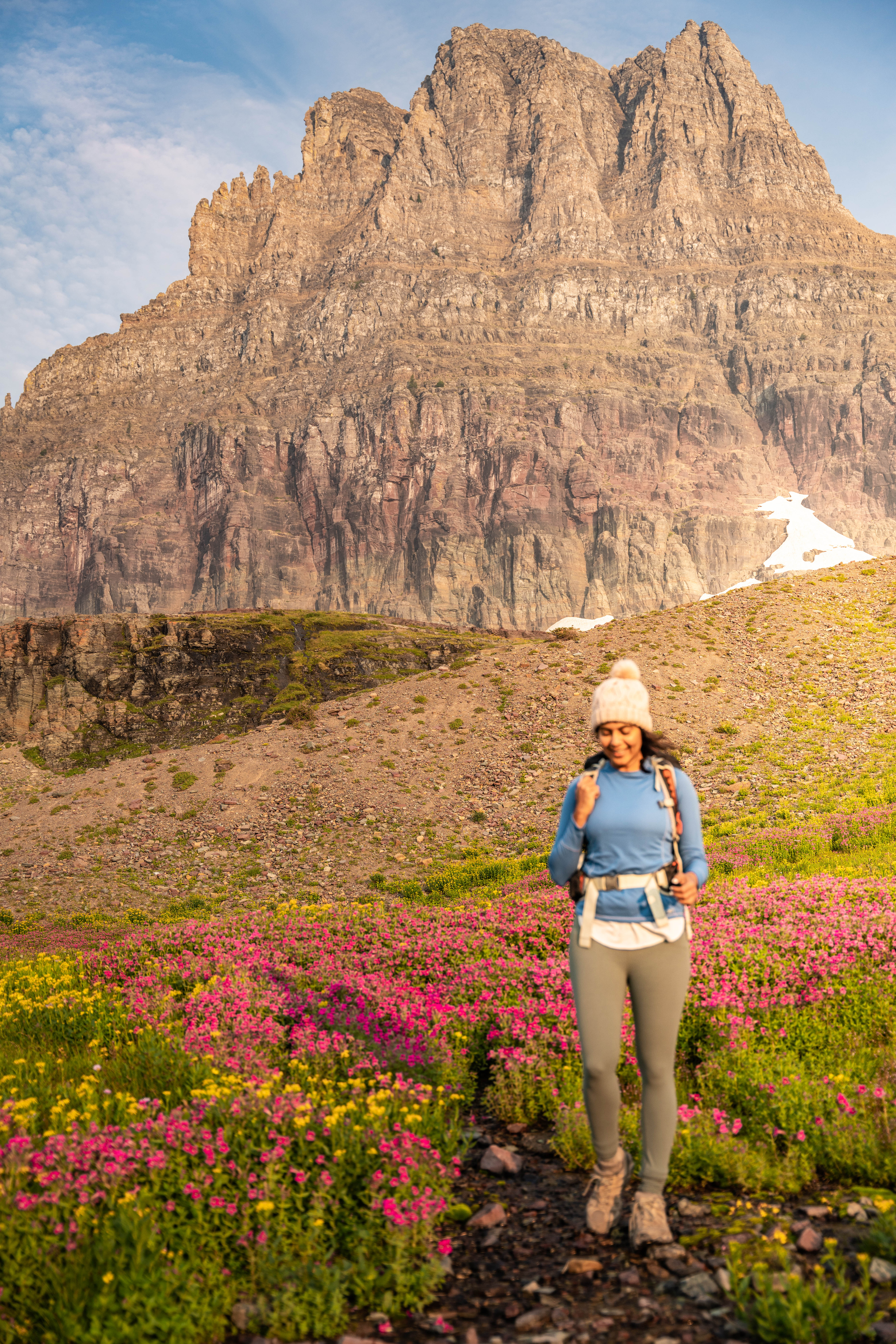
Avalanche Lake Trail: Total altitude: 3,865ft. Elevation Gain: 757ft. Total miles: 5.9mi. This trail is one of the most popular hiking trails in Glacier National Park. 5.9 miles round-trip, it is only 757ft elevation gain, so it’s a great first warm-up hike before you attempt the others on this list. You first see the mountain backdrop 2+ miles in after you get to the North/West end of the lake. The remaining distance brings you to the other side of the lake. Walk long the lake and check out the reflections in the early morning light. Tip: Get here for sunrise so you can get the best light and avoid the daytime crowds.
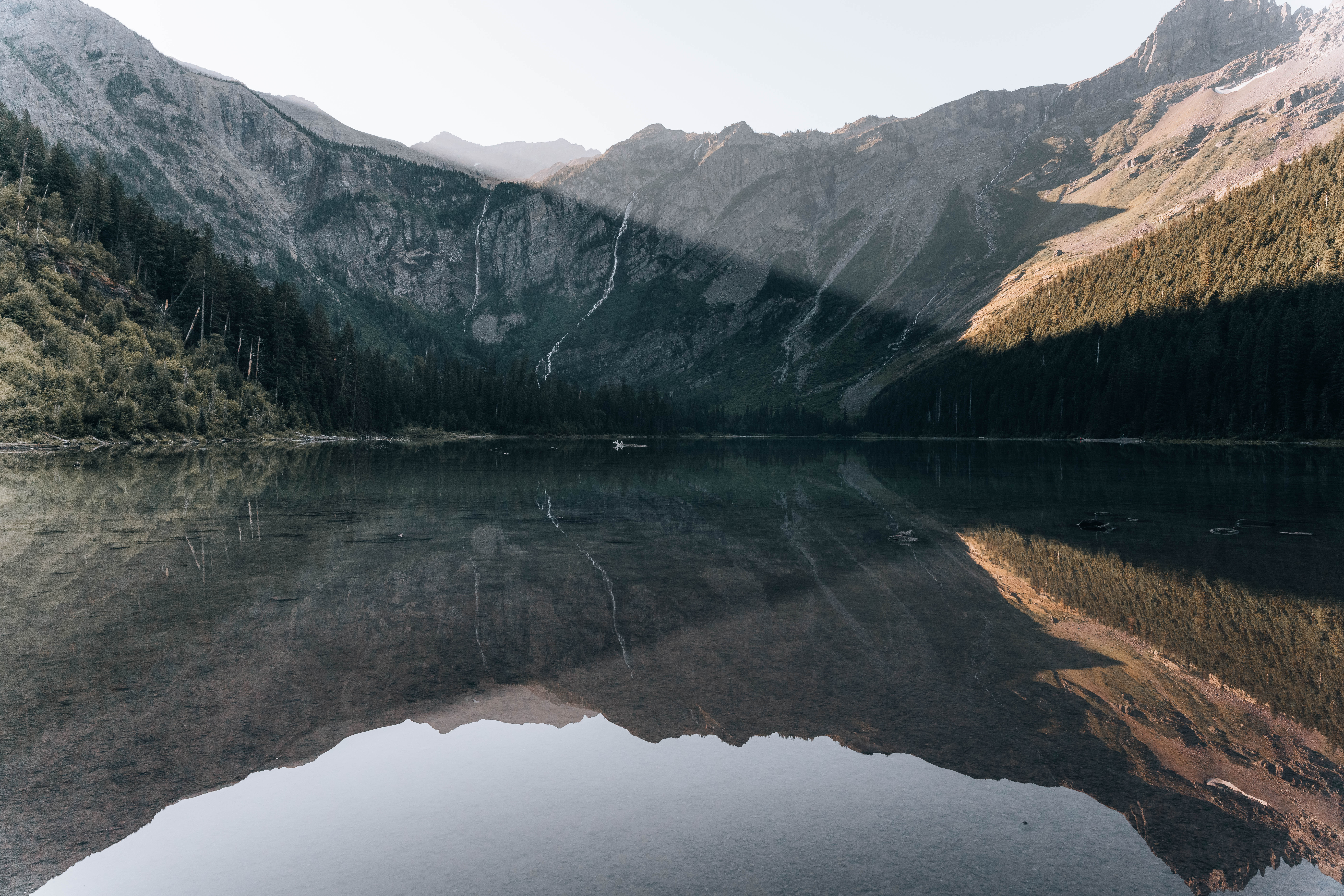
Highline Trail: Total altitude: 7,510ft. Elevation Gain: 2,830ft. Total miles: 13.1mi or 15mi approximately depending on if you decide to hike to the Grinnell Glacier Overlook. The Highline Loop in Glacier National Park begins from the north side of the Going-to-the-Sun Road at Logan Pass. Although this hike includes the word “Loop” in its name, this is actually a one-way hike. The “Loop” refers to a bend in the road on the west side of the park where this hike ends. The best way to do this hike is to park at The Loop, located 13.1 miles east of the McDonald Lodge on the Going-to-the-Sun Road, and then take the free shuttle up to Logan Pass. A popular hike, the Highline follows along the Continental Divide, also known as the Garden Wall throughout this section of Glacier National Park. At 6.9 miles hikers will reach the Garden Wall Trail.
The Optional Garden Wall Trail
This optional side trail climbs just over 900 feet – in less than nine-tenths of a mile – to reach the top of the Continental Divide to the Grinnell Glacier Overlook (you will be at 7,510 feet altitude), and provides hikers with a commanding birds-eye view of The Salamander and Grinnell Glacier on the opposite side. I found this section super steep and hard, but hiking poles really helped! At 7.6 miles you will reach the Granite Park Trail junction. Turn left and the trail will lead you down to The Loop on the Going-to-the-Sun Road. Because much of this route passes through prime grizzly bear habitat, it’s extremely important for hikers to make a lot of noise, carry bear spray, and hike in groups. Note: this hike is hard and you will need good hiking shoes, lots of water, lunch/snacks, and a sun hat if you’re going in summer.
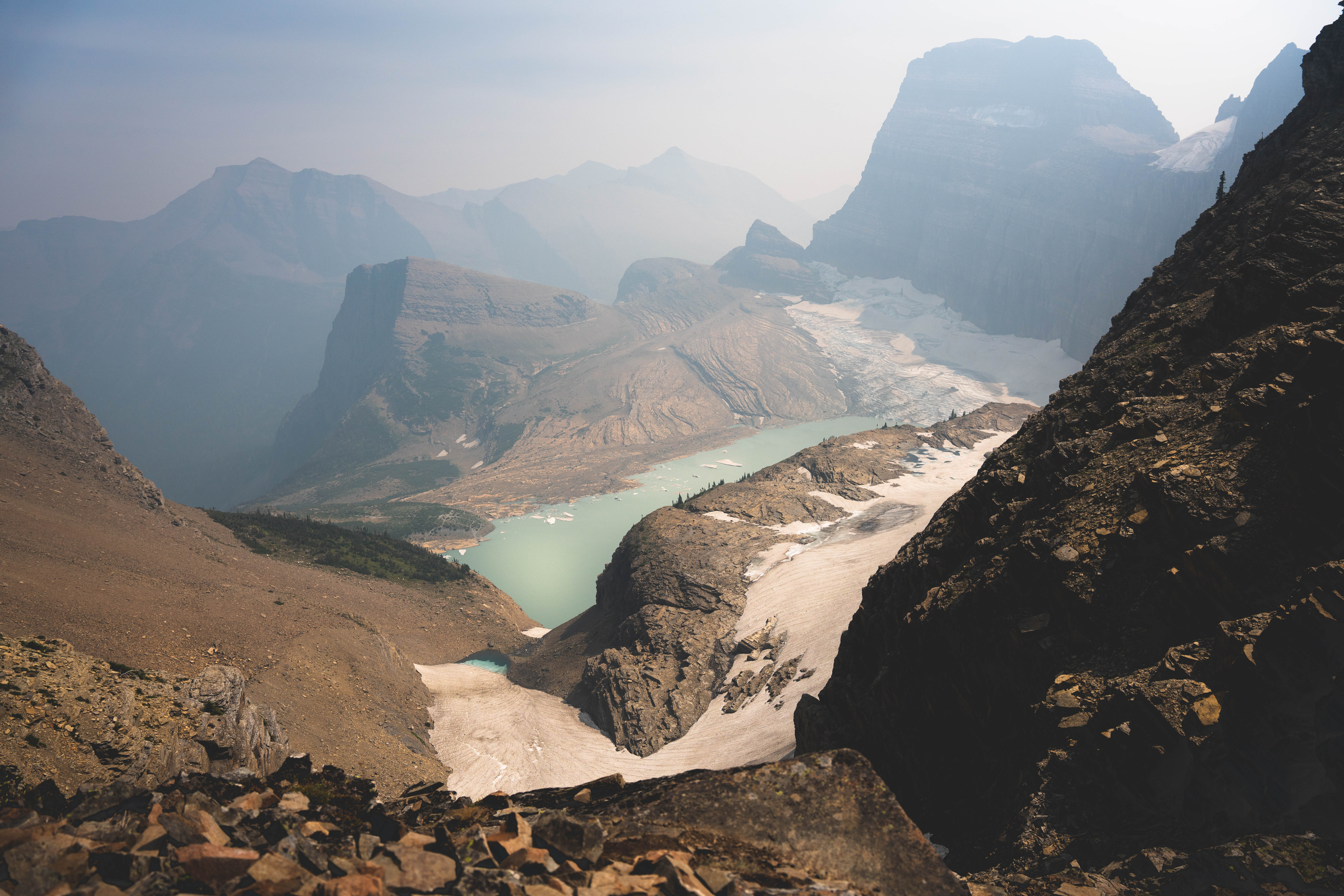
Iceberg Trail: Total altitude: 6,160ft. Elevation Gain: 1,275ft. Total miles: 9.3mi. This is a 9.3mi out and back trail. This is also one of the of the best trails I have ever hiked! So beautiful from start to finish. A little bit of challenging incline in the beginning, but definitely moderate throughout the hike. The lake itself is a stunning turquoise color with icebergs floating in it. Again, note my friend encountered a Grizzly on the way (he was by himself, without bear spray) and he could have died, since the bear charged him. Tip: Always carry a bear spray/whistle and don’t hike alone.
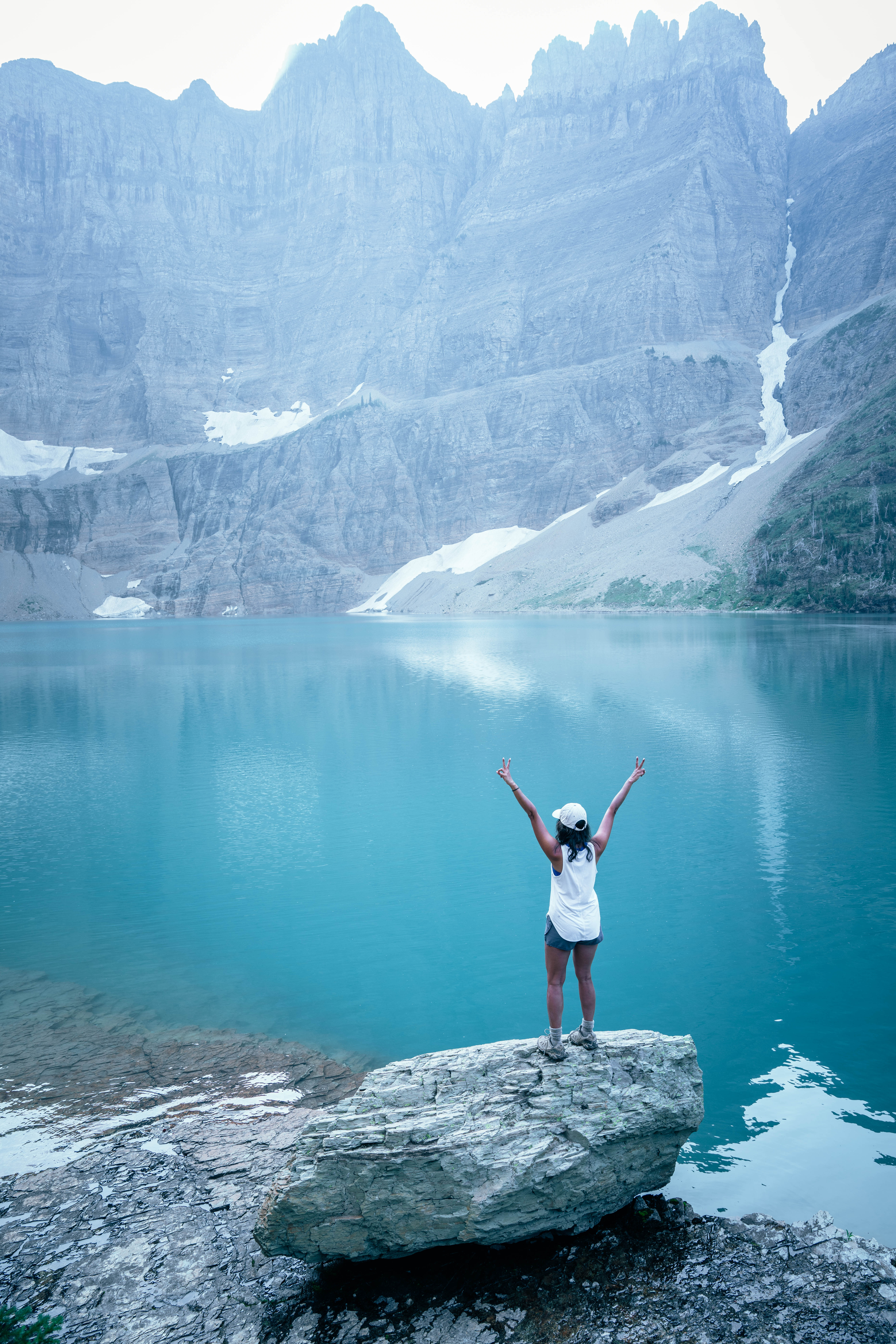
Must-Do Easy Activities in Glacier National Park
- McDonald Lake: If you don’t want to go hiking in Glacier National Park, you can simply drive up to this beautiful lake with colorful pebbles. You have the opportunity to hang out at the beach, swim or kayak. You can even dine at Lake McDonald lodge!
- Going to the Sun Road: Don’t feel like hiking? Drive the Going to the Sun Road, the views are spectacular. Travel along the Going-to-the-Sun Road to St. Mary. Take advantage of the various pull-outs and scenic view points along the way. Recommended stops include Trail of the Cedars, Logan Pass Visitor Center, Jackson Glacier Overlook, Sunrift Gorge and Sun Point.
- Take a boat tour: Grab a seat on the DeSmet (advance reservations highly recommended) with Glacier Park Boat Company. Climb aboard the historic vessel just steps below Lake McDonald Lodge. Cruise the pristine water and listen to the captain or one of the Park Rangers provide commentary on the scenic tour. Boat tours are offered on five lakes in Glacier National Park including St. Mary Lake, Lake Josephine, Swiftcurrent Lake and Two Medicine Lake.
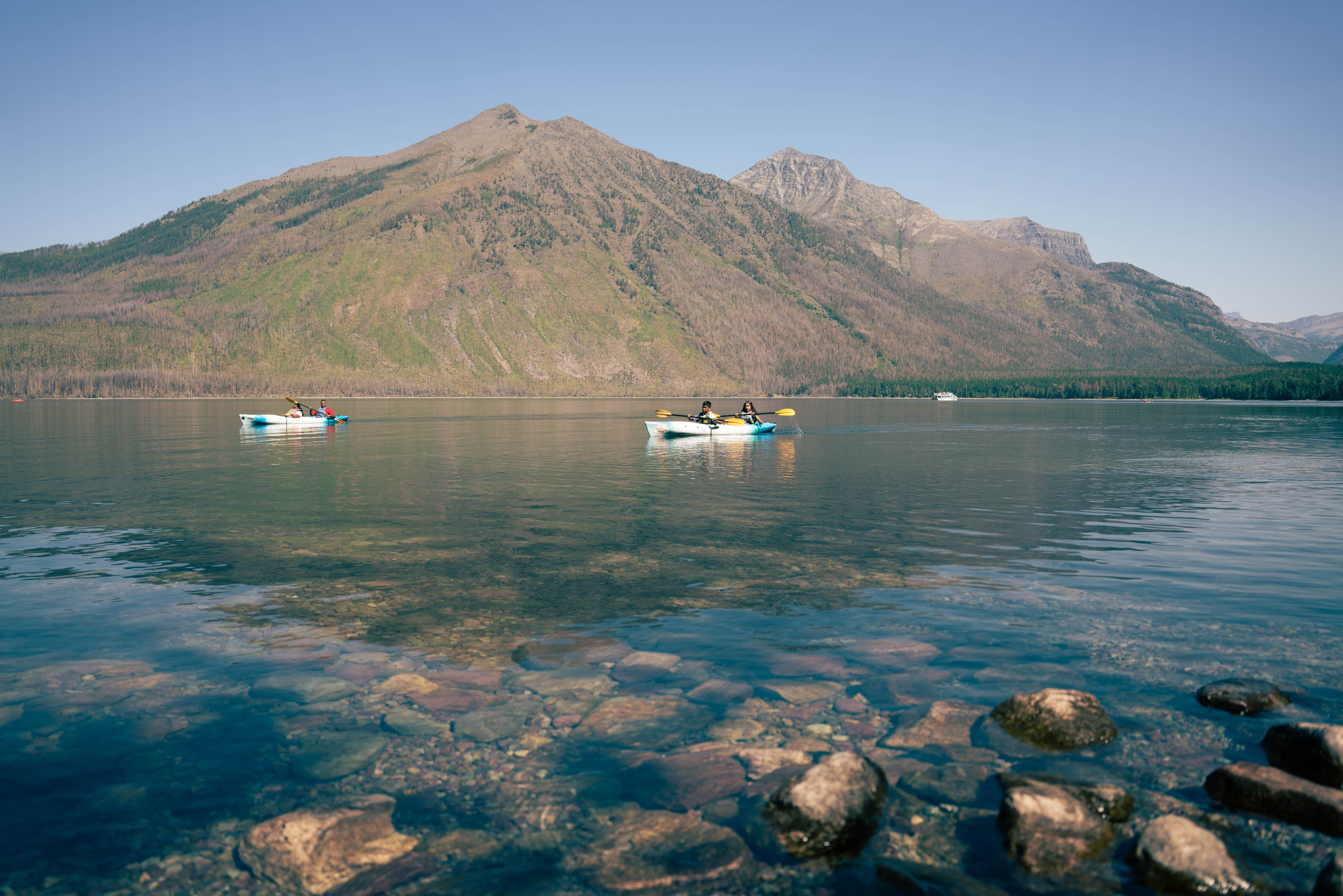
Where to Stay when Hiking in Glacier National Park
Hotels
- For hotels inside the park, contact Apgar Village Lodge and Motel Lake McDonald: (406) 892-2525.
- For Village Inn Motel, Lake McDonald Lodge, Rising Sun Motor Inn, Swiftcurrent Motor Inn, and Many Glacier Hotel contact: (855) 733-4522 – (855) SEE-GLACIER
Camping
For camping in Glacier National Park check out this link.
Cabins
Glacier National Park has two backcountry chalets that visitors can hike to for overnight accommodations. Both are operated by Belton Chalets Inc. For reservations contact: (888) 345-2649
Outside the Park
Columbia Falls is the closest city to Glacier National Park. I stayed at the cutest place called ROAM Beyond. The setting amidst mountains is spectacular and serene! You will be staying in wagon trailers equipped with comfy duvets and bunk beds (one queen bed). The trailers have a bathroom with shower but you can also in the main lodge (you need to sign up for this) or use the outdoor showers. I didn’t enjoy the outdoor showers because it was really difficult to control the temperature of the water.
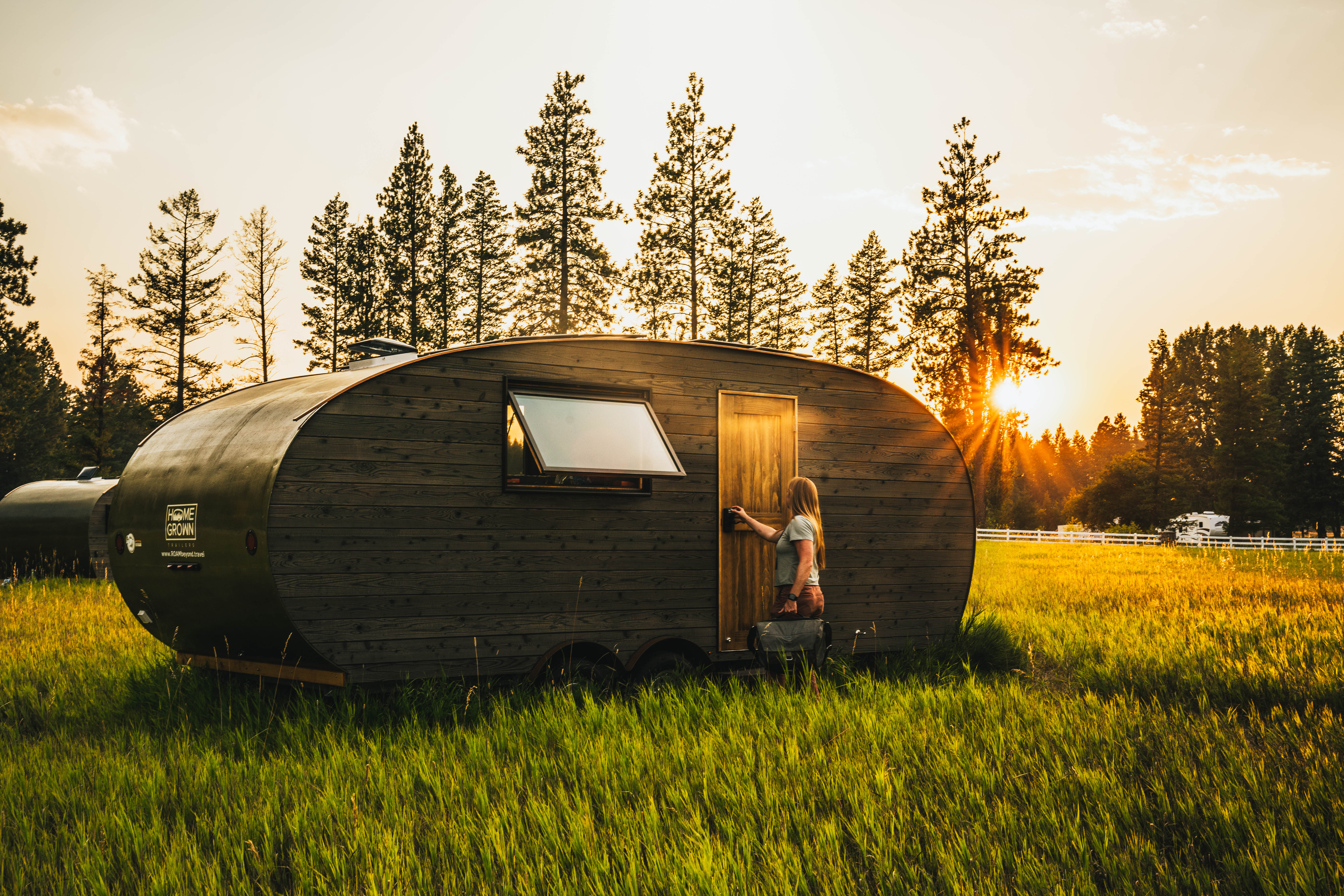
Getting Around Glacier National Park
- Many roads within Glacier National Park are seasonal. Check Road Status to see what’s open.
- Some roads outside the park are seasonal as well (parts of U.S. Hwy 89, for example). Check the Montana Department of Transportation map for road status.
- There are no fueling stations within Glacier’s boundaries.
- Parking is an issue, particularly at Logan Pass Visitor Center. During summer, that parking lot often fills by late morning. Visitors are encouraged to travel early or use the free park shuttle to avoid congestion. Tip: I got to Logan Pass before 6am and was able to find parking!
Driving Times
Times within and around the park are estimates and will vary with construction and time of day.
- St. Mary to Many Glacier Valley: 20 miles, 30-40 minutes
- St. Mary to Two Medicine Valley: 34 miles, 1 hour
- St. Mary to Waterton Lakes National Park: 50 miles, 1 hour plus customs
- West Glacier to East Glacier: 56 miles, 1 hour
- West Glacier to St. Mary (Going-to-the-Sun Road): 50 miles, 2 to 2 1/2 hours
- West Glacier to St. Mary (US Hwy 2 to Hwy 89): 90 miles, 2 to 2 1/2 hours
- West Glacier to Many Glacier: 70 miles, 2 1/2 to 3 hours
- West Glacier to Polebridge: 28 miles, 1 hour
Shuttle
Please visit the park’s Glacier’s Shuttle System page for more information. There is also a seasonal Hiker’s Shuttle
offered by Glacier National Park Lodges for a fee. It connects West Glacier, Apgar, Lake McDonald Lodge, St. Mary, and Many Glacier. Reservations required.
Buses
Glacier National Park Lodges (Xanterra) offers tours throughout the park if you don’t want to drive. Sit back and enjoy the park’s spectacular scenery in a historic Red Bus. On clear days, the canvas roofs are rolled back and transformed into convertible buses. You can also learn about the Blackfeet Indian culture while traveling in a comfortable 25-seat passenger bus equipped with large windows and air conditioning, also accessible with ramps and lock downs. For information and reservations, please visit Sun Tours.
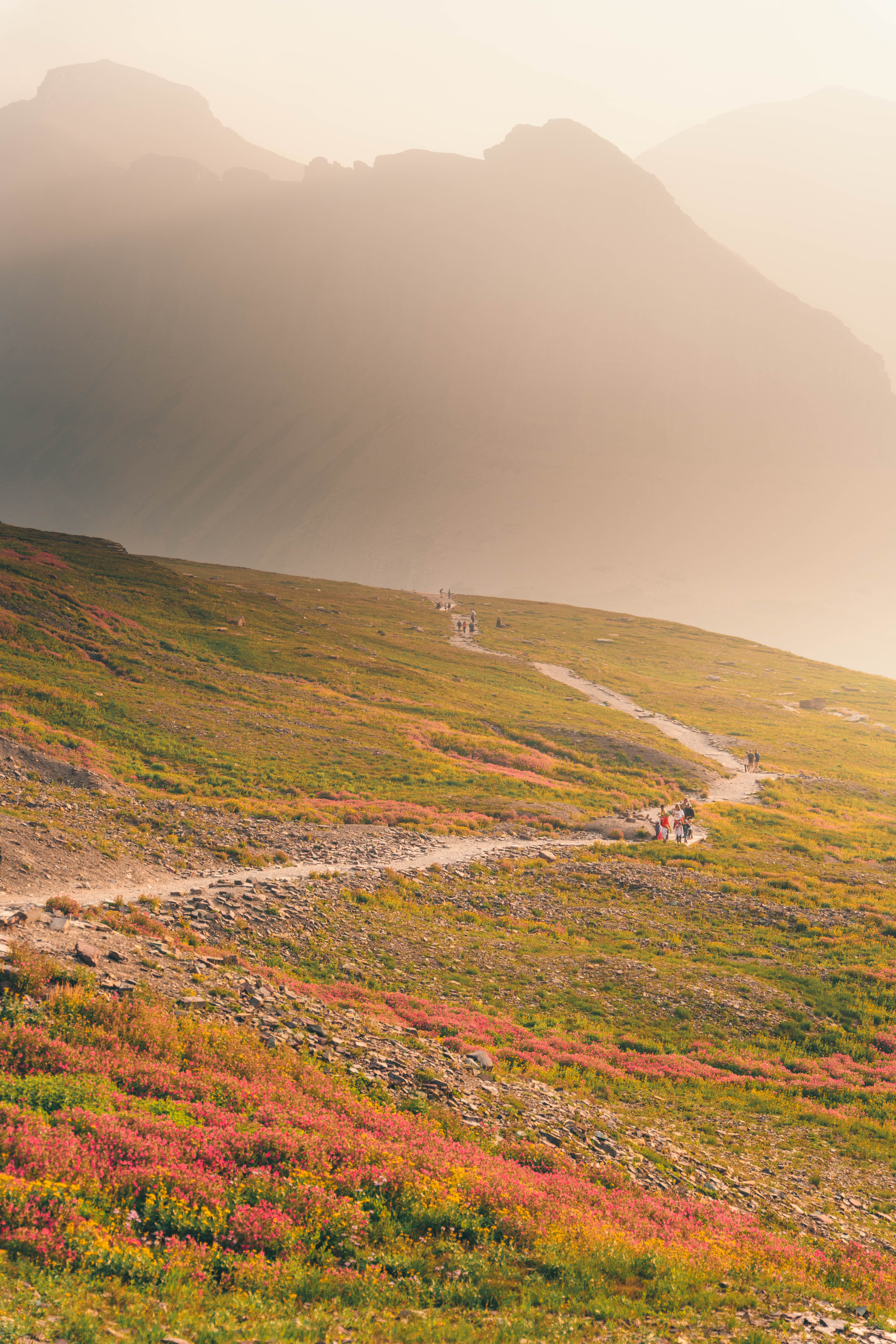
Where to Eat
When hiking in Glacier National Park, note that there are no grocery stores in Glacier National Park. In West Glacier, check out Eddie’s Cafe with the attached convenience store. Many Glacier hotel also has a small store in the basement of the hotel. Restaurants are only open during peak season from late June through Labor Day.
Restaurants
The Lake McDonald Lodge features three dining options: Russell’s Fireside Dining Room offers breakfast, lunch and dinner, and both Lucke’s Lounge and Jammer Joe’s Grill & Pizzeria serve lunch and dinner. Try the elk burger at Russell’s accompanied by a Montana craft brew. Lucke’s also offers a traditional menu of soups, salads and sandwiches, while Jammer Joe’s is a kid favorite, serving up pizza, sandwiches, soups, salads and an all-you-can-eat lunch buffet.
The Ptarmigan Dining Room at Many Glacier Hotel doesn’t take reservations, but it’s worth the wait to dine on locally sourced ingredients served in a continental fine dining style, set off by the panoramic lake views. The menu features seared duck breast and grilled salmon, as well as classics like Cobb salad and burgers. They also have a vegetarian pasta. The hotel’s Swiss Lounge offers light fare from lunch to late night: think Montana-style bar food from bison chili to sausage platters complete with pretzel chips. At the Rising Sun Motor Inn & Cabins, Two Dog Flats Grill dishes out American comfort food.
Huckleberries
Before you leave Montana, you have to have huckleberries, a staple Montana treat. These little berries are a cousin of blueberries, but are less sweet. At the shops in and around the park, you’ll likely find a variety of huckleberry items like candies, syrups, preserves and ice cream. Alternatively, several area restaurants have huckleberry on the menu as a sandwich spread or a drizzle on cheesecake. Outside the park there are several options to stop and have Huckleberry ice cream too! Each day, after hiking in Glacier National Park, I would end the day with a huckleberry ice cream – don’t miss this!
Final Thoughts on Visiting Glacier National Park
I would not recommend hiking in Glacier National Park alone. Because this is bear country (think Grizzly), hike with a group if possible. There are also opportunities to join groups.
Group Hiking
- Check the Ranger-led Activities page for information on joining a hike with a park ranger.
- Glacier Guides offers guided half day, full day, overnight hikes and chalet hikes. Porter services to deliver your gear to backcountry campsites are available. Equipment rental in West Glacier is available. See the Guided Hiking page for contact information to schedule a trip.
- Some boat tours in Many Glacier and Two Medicine offer optional guided hikes conducted by either park rangers or Glacier Park Boat Co. employees.
Backcountry Hiking
If you are planning to camp overnight in Glacier’s backcountry, you must stop at the Agpar Backcountry Office, St. Mary Visitor Center, or other ranger station to obtain a backcountry permit. Visit the Backcountry Camping page for in-depth information about backcountry camping and hiking in Glacier National Park’s backcountry.
Day Trip
Nps.gov recommends that if you are taking a day hike, then fill out a voluntary Day Trip Plan (pdf) form and leave it with your hotel or a companion not hiking with you. This voluntary form could be a valuable tool for search and rescue efforts if needed.
If a search is initiated because others reported you overdue, the National Park Service will check with the hotels to see if a Day Trip Plan (pdf) was filed and use it to help focus their search efforts.
How to Help Preserve Glacier National Park
There are so many ways to help preserve this beautiful park when you go hiking in Glacier National Park. Leave No Trace is a way of thinking, an attitude, and an ethic, that helps us reduce our impact on the places we love. I urge you to read this link by nps.gov on what each of the bullet points below mean for us visitors to the park. You may learn a thing or two, I know I sure did when I first came across the Leave No Trace principles.
- Plan ahead and prepare
- Stay on durable surfaces
- Dispose of waste properly
- Leave what you find
- Minimize campfire impacts
- Respect wildlife
- Be considerate of other visitors
- Reduce the impact of social media #protectglacier
If you have been to Glacier National Park, please drop me a comment on what your favorite part of this national park! Thank you for reading and I hope my guide to hiking in Glacier National Park helps you plan your trip!
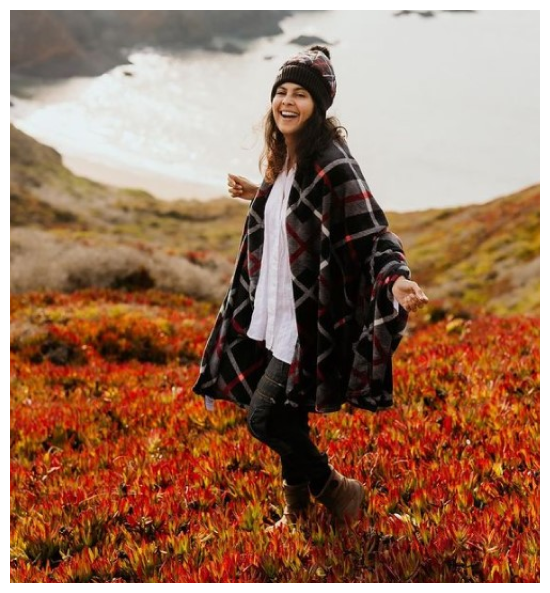
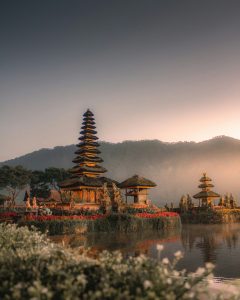
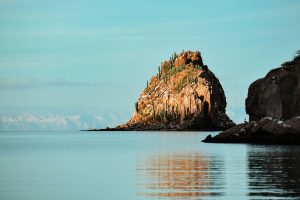
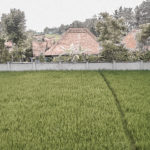


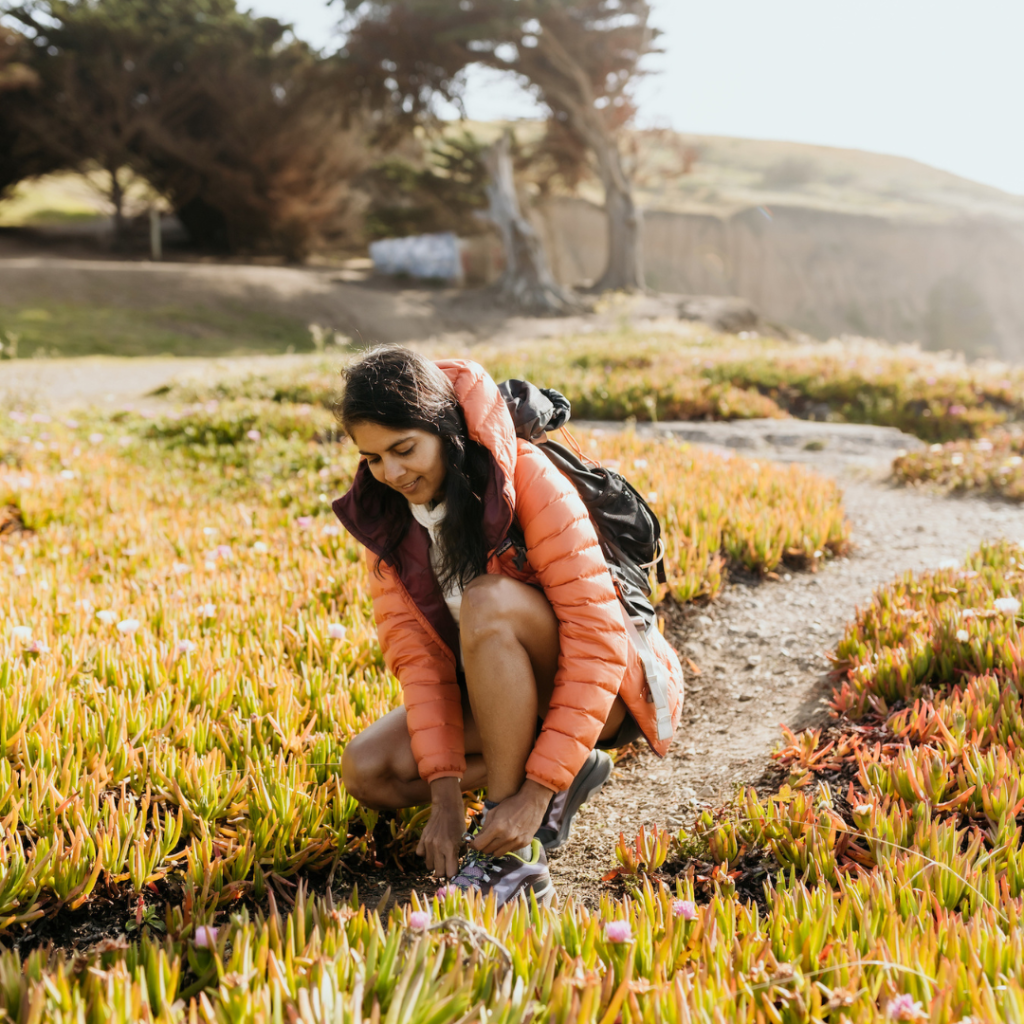
22 Responses
Thank you for your wonderful content, this park is on my to-do list and this is a great post 👏 greetings from Sac…
Yay happy to hear that, thank you so much! It’s a beautiful park!
Love your blogpost and all the tips! I’ve been to Glacier NP last September and the season was already about to close. Really enjoyed that there weren’t any crowds. But weather changed and I definitely want to get back and go on some more hikes. Your pictures and IG stories look awesome!
Thank you so much!! Yes weather makes all the difference in regards to what we can do when we are there 🙂 This is a place we need to visit multiple things to get the full experience I think!
Can’t wait to go back to this park with all these tips.
YAY 🙂 Thank you!
Loveeee ur blogs!
Thank you Hemaaaaaa 🙂
Love the post and excited to try some of these. Quick question, when you mention elevation do you mean elevation gain or elevation where the hike starts?
I have actually clarified that – I put the elevation gain, altitude separately for each hike….
Omg!! So much details. Love the pictures. You really have covered it all and I feel that I don’t have to spend a lot of time for research! Can’t wait to visit.
YAY! I love hearing that….I’m sure there are more hikes, but these 4 are my fav and I think they will give you a good idea of the national park 🙂
Amazing trip, love your Instagram, I didn’t know you had a blog… thanks!
Thank you so much, yes just starting to write more 🙂
This is so helpful! I’m definitely adding Iceberg Lake to my list of hikes on my next visit.
Ahhhh thank you so happy to hear this! Iceberg was my absolute favorite!
Was your friend hurt bu the bear on the Iceberg Trail? That is terrifying.
He was terrified! Luckily no…it charged toward him, growled as he yelled ‘no no’ and threw his hands out wide, and turned around and went back!
Omg I love this! Thank you!!
This makes me so happy, thank you 🙂